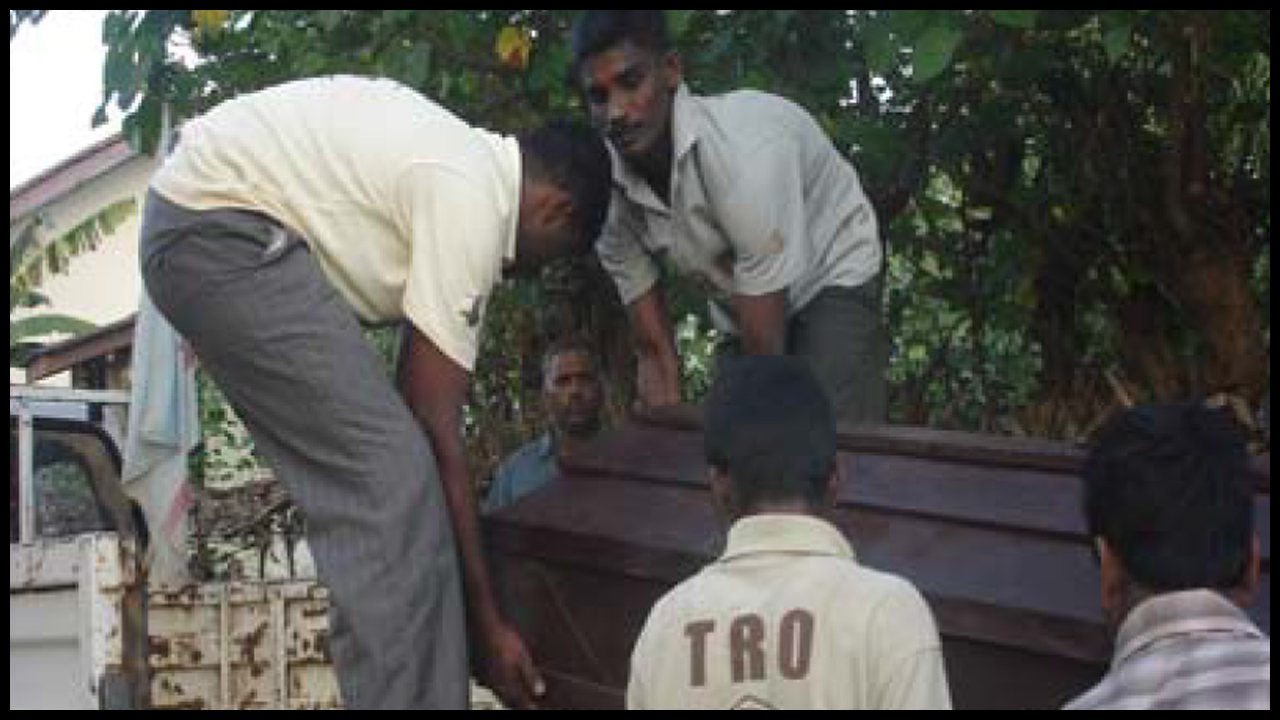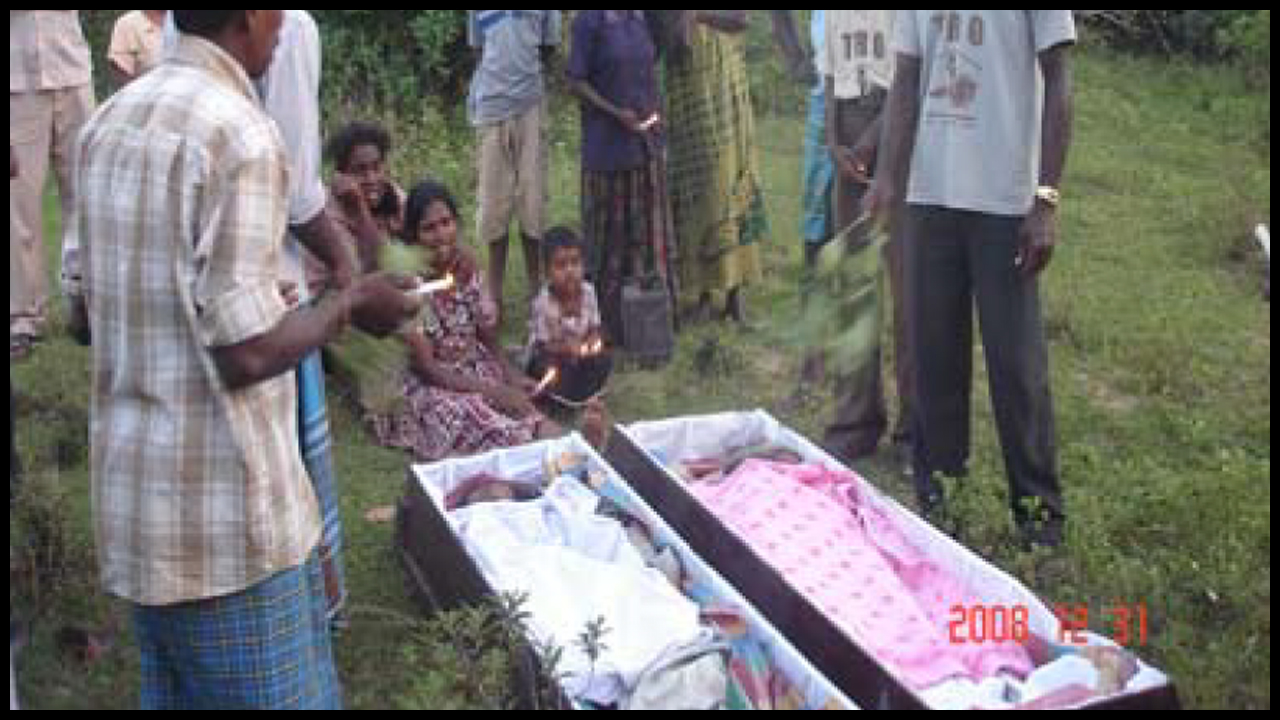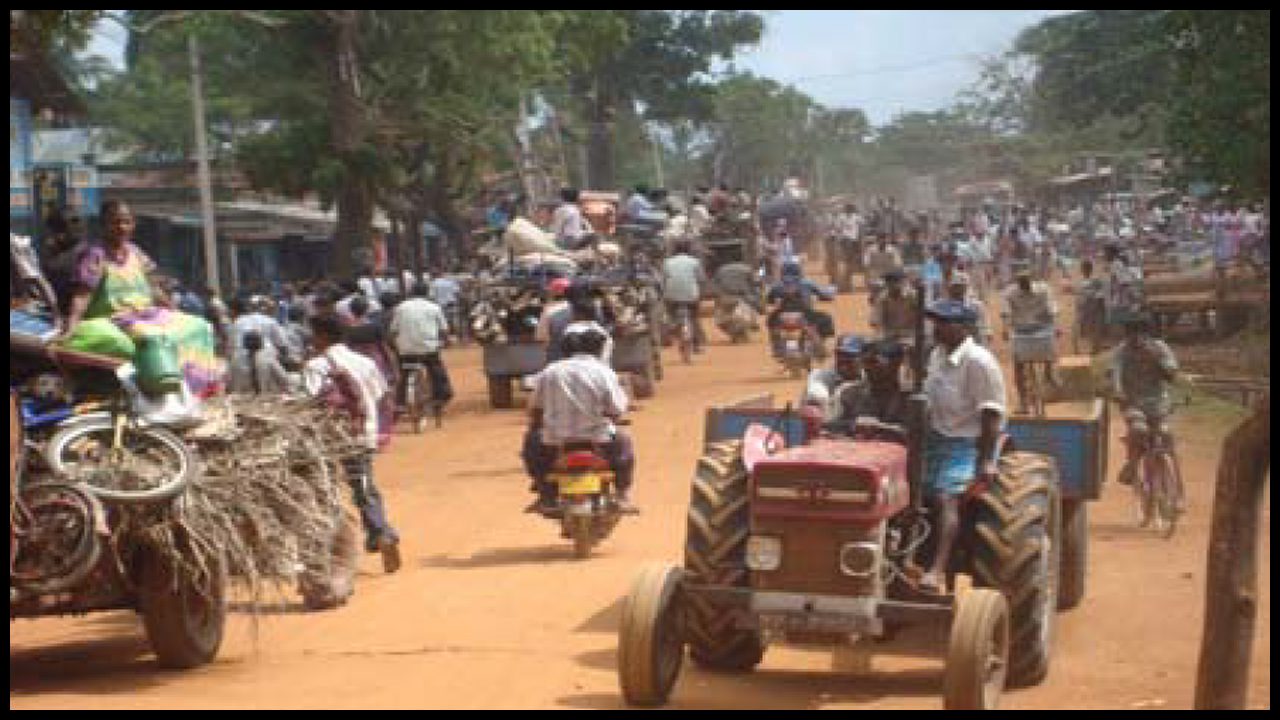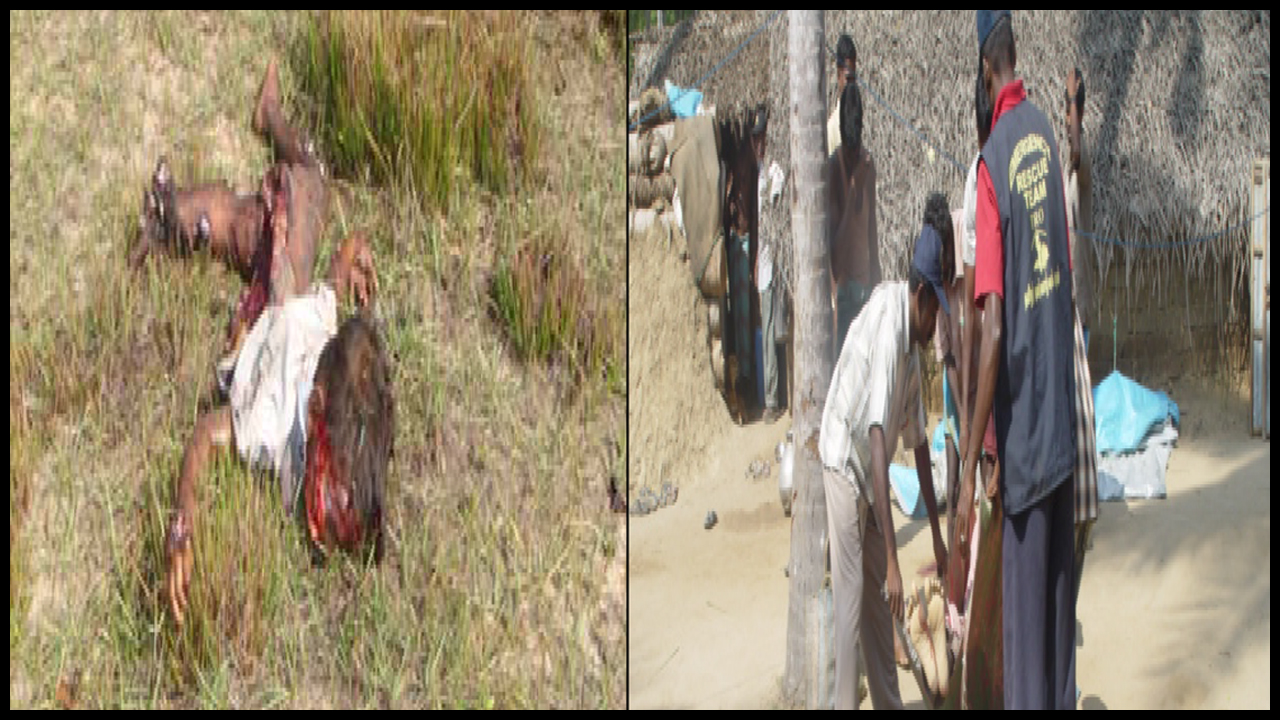On the Spot Report – my personal Experience – Lawrence Christy,
Planning Director, TRO – Latter part of January, 2009.
Narrow roads. Labyrinth of death. Broken vehicles parked by roadside made the roads more narrow. According to practical regulations imposed by local authorities for managing emergency situation only one row of vehicles can go upward while downward another row of vehicle can come in. Two rows up and down can move simultaneously with great difficult of maneuvering. It normally works well. But when a vehicle is broken
in the middle of the road – even when it is parked sideway mayhem erupts. Two vehicles can’t pass at the same time. Thousands of vehicles – lorries, canters, tractors with trailers,
land masters, motor bikes and cycles with hundreds of thousands of people moving both ways get stuck into the long lasting standstill. No move. The fear of shell attack on the roads – crowded by fleeing thousands of IDPs make more of them to move into that quagmire.
 It happens many times in a day. To dismantle each knot of standstill it takes many hours. While this hectic hour prolongs endlessly without any warning a shell fell in the midst of the pool of people and vehicles. A tractor was burning along with the driver. Following that a cluster of bombs fell with nasty destruction effect with the sound of thunder and lightening.
It happens many times in a day. To dismantle each knot of standstill it takes many hours. While this hectic hour prolongs endlessly without any warning a shell fell in the midst of the pool of people and vehicles. A tractor was burning along with the driver. Following that a cluster of bombs fell with nasty destruction effect with the sound of thunder and lightening.
The people were lying down cover. The spot when the shell fell was strewn with blood, bones and flesh. At that time a whole family of 2 children, father and mother were wiped out. They could not be identified immediately. No body was in full shape. All parts have
to be swept into a big heap. Then the injured were crying and howling with pain for help. Blood was everywhere – on the ground and all over the bodies of the injured. A woman was calling hoarsely for help. Her both legs were dangling from her hip – pouring blood profusely onto the ground making the earth bloody red.
Injured were taken away by ambulances to hospital with siren sound. They too get stuck in the traffic jam regularly with injured people piled inside. TRO took the bodies of the family and the driver in its canter vehicle packing the bodies with white cloth and mats. After that TRO would announce by Uravupalam (Bridge of relationship) for the relatives to come and claim. TRO would hand over the bodies to their relatives for cremation or burial.
 Displacement and vulnerable people:
Displacement and vulnerable people:
During displacement the hardships faced by the vulnerable people are extraordinary. The women especially those who head a family carrying their whole house hold goods on their bicycles – pushing them with great difficulty through the maze of vehicles –
maneuvering through muddy gravel roads with pit holes and along the sandy coastline which inter the feet and the loaded cycle deep into the sand face a hazardous journey.
When the women push the bicycles with loaded goods using their maximum strength the children small and big follow them behind in that long journey. Infants are normally seated on top of the house hold items. Domestic animals – dogs, cows and goats follow suit. When the bicycle stuck into the muddy or sandy mess or when the cycle crumples and falls down some one has to help them to straight it down. Pregnant women: How difficulty for a pregnant woman to walk through this mass of people with loaded vehicles and speeding motor cycles? Heating sun during the day and chilling cold in the night. Blaring sound of the vehicles and cursing and shouting voices of the people. They will walk long distances carrying a bag – tired, haggard and sweaty. Some pregnant women go with their husbands or brothers seated on the back seat of a bicycle. Going slowly in this position on a bicycle with the crowd of people is a crucifying experience.
Children: Under the punishing heat of the sun walking on the gravel and sandy lanes – most of the children without slippers undergo an unthinkable agony. Being seated on top of the goods packed up in the vehicles which move very slowly or wait in traffic jam is another tormenting episode.
Old, handicapped and mentally retarded: They are being carried on bicycles – no special arrangements for their special needs. A man was carrying his old father by having a stool temporarily fitted in front. The old was seated on the stool and his son was pushing along the road. We could see disable people going on wheel chairs through the jungle of vehicles. Mentally retarded young children were carried by their parents in their hands.
Many people were walking painfully among the crowd with crutches.
No International NGO or UN organization was there to take care of them. During cease fire time hundreds of NGOs were here in Vanni preaching lofty principles and standards towards fulfillment of special needs of the vulnerable groups. Even the roads and
buildings have to be built to cater to their needs. Now only the local NGOs are looking after them even in this dire situation of being attacked by shells at any time. At Iraniapalai, even the homes of mentally retarded women and women welfare centres run by an NGO CWDR (Centre for women’s Development and Rehabilitation) were subjected to severe shell attack recently. For their own security they have sold their souls.
Earlier in the year 2008 the displaced people moved to safer places at a distance beyond 10 kms. Now the movement is to a short distance of one or 2 kms. When people find that they will be safe at a kilo metre distance the whole lot of 300,000 start moving with their goods. As this movement occurs suddenly with the heavy shelling, rifle and LMG firing and troop penetration people start moving. One of my friends just finished putting his shelter. When a dangerous situation arose he had to move elsewhere immediately leaving his shelter without time for dismantlement. With this sudden movement traffic jams occur and worsens the situation.
Earlier people moved one or two tractor loads of goods. When they were displaced for several times the goods dwindle to be put into a land master. When situation warrants immediate evacuation people go with one or two bags with essential and valuable things leaving their goods and domestic animals. They leave even the pet dogs which they loved so dearly. Finally they decide if they can safeguard their own lives and family that is enough. Survival of our lives becomes more important than anything else. An NGO worker, my friend lost two of his children who were his only children by a shell falling among the playing children in front of his shelter. He and his wife survived with injuries.
When I met him at the hospital he told me, “It would be good if they survived and we two perished.” pointing at her wife.
A sample of incident
The shelling started after midnight. It lasted nearly 2 hours without stop from 12.20 AM to 2.30 AM. About 300 shells fell on that fateful day within 1 KM radius. Shells fell at each and every minute. At least 30 shells fell within 100 metre radius around our bunker – beside our tarpaulin shed. Our bunker is almost an open bunker – overhead is covered by doors made of timber – they are not strong enough to withstand a direct hit of a shell. If the bunker gets a direct hit no salvation to all of us inside the 4’ x 4’ L shape bunker.
My wife, myself and my 2 year old girl child who was born after 10 years of my marriage life were in a corner in a crouched position. My friend’s family with 2 children and two members of another family – one teenage girl and her mother. The bunkers are all over the place – because the shelters are so closely built. A gentleman
told me even the sound of our breath will be listened to by a person next door. Over 300,000 pople are cramped into 4 or 5 villages. The chances increased for the shells to fall into the bunkers. Earlier there was one percent chance for a shell to fall into a bunker. Now it increased to 20% to 30%. A shell will fall either on a shelter or on a bunker or on a small space between them. When cluster bombs are fired the chances for death increases many fold.
Our bunker was shaken by falling shells at close proximity. The light of the explosions penetrated the darkness and flashed into our bunker like a striking lightning. Shell pieces rained over our bunker.
A mother who took cover under a parked lorry nearby – about 50 metres away from our bunker was crying, “Iyo, my child got injured. Someone help us to take him to hospital. Noone dared to go out and help the child to be taken to hospital which was 300 metres away. A male voice said,“ Amma, wait a few minutes – there will be a brief pause.” The shells were falling at some distance. The mother, her boy child of about 12 years old and
a man emerged from the bunker. I too reluctantly got out of the bunker shielding away from the protests from my wife and others. We all took the boy who was wounded on a stomach and admitted him and returned quickly again to the bunker.
Another shell fell too close to our bunker with shattering effect. Our neighbour – a woman lost her too legs – she was taken to hospital by an ambulance arrived at the scene.
 We were so lucky – we were not hurt. The experience is never forgotten. So thrilling – so panicky – no nauseating – waiting for a doom with fear and imagination of a shell falling within us mangling our bodies into a pulp. A lady beside us was calling all gods for help. At any time a shell may fall on our bunker killing all of us. A bunker with covered sand bags or Palmyra logs overhead is relatively safe.
We were so lucky – we were not hurt. The experience is never forgotten. So thrilling – so panicky – no nauseating – waiting for a doom with fear and imagination of a shell falling within us mangling our bodies into a pulp. A lady beside us was calling all gods for help. At any time a shell may fall on our bunker killing all of us. A bunker with covered sand bags or Palmyra logs overhead is relatively safe.
That night – in the area called “B” part of Devipuram 18 civilians were killed and injured over 100. The strange thing was that there was a drone flying overhead. I think it was not fixing any military targets – but it was fixing targets where the civilian concentrations were – where the bunkers in civilian settlement were – where the IDP movements were and where the traffic jams occurred.
Government’s claim is right – the shelling is not indiscriminate. It is very much clearly targeted – knowing very well that the targets are civilian. They use it for military purpose to achieve military objectives. When they wanted to chase the people out of a village they launched shell attacks with devastating effect. At Devipuram at a certain point of time when they found they could not round up the people in that village they wanted to chase all of them out and corner them in another village advantageous to them. Or to stop the people from fleeing from one village with the hope they would capture that village. These shell attacks were on roads – on fleeing civilians or on traffic jams. Or otherwise as a revenge killing to compensate the losses on the battlefield – to even the score.
We were lying law until the nightmare was over – to be repeated again elsewhere.
The above photos are about Iranaipalai incident on 18th February, 2009.

